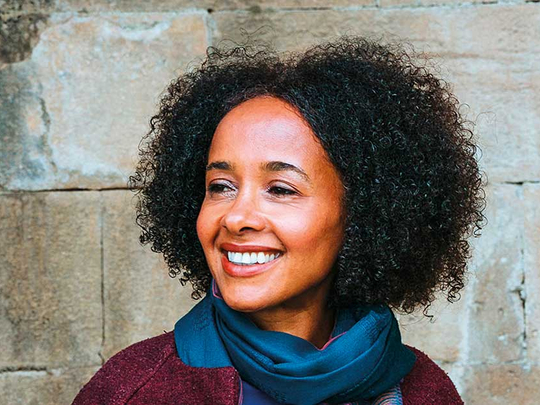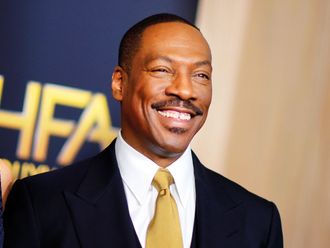
Barack Obama on the cover of Time magazine, Toni Morrison and Angela Davis striding out in 1970s New York, Fela Kuti and Cassandra Wilson — one wall in the novelist Diana Evans’s south London family home is devoted to beautiful portraits of extraordinary people, just one of many personal details that creeps into her third novel, Ordinary People. Beneath this wall of black and white photos sits a sunshine yellow armchair. Evans buys herself a chair after each book, “a reminder that aimless contemplation is as important as achieving”. A large swinging chair, still finding its place in the front room, is her reward for this latest novel.
Ordinary People opens in the autumn of 2008 with a party to celebrate Obama’s election and ends with Michael Jackson’s death in June the following year. “They were both such huge pivotal political, cultural moments,” she says now. “I felt the span of that year needed to be recorded.” The title is taken from a song on John Legend’s Get Lifted album, the soundtrack to the novel (Evans used to be the arts and music editor of Pride magazine : “Music keeps me at my desk”), capturing the mood of this soulful, witty and a little bit sexy story about ordinary people who have come adrift. With a five-year-old daughter and a new baby (like the author at the time she wrote the novel) Melissa and Michael are — in the words of Legend’s song — “past the infatuation phase, right in the thick of love”. In their 13th year together, living in the 13th house on a street named, ahem, Paradise Row, M&M, as they are known to their friends, are clearly heading for trouble.
Evans’s acclaimed 2005 debut, 26A, a strongly autobiographical story about twins growing up in Neasden, north London, is also bookended by momentous events: the 1981 royal wedding and the death of Princess Diana in 1997. “When there’s a death of a public figure I’m drawn to record it somehow in the lives of my characters,” she observes. But it was a private tragedy, the suicide of her twin almost exactly 20 years ago, when they were 26, that compelled her to write. “It wasn’t until my twin passed away that I had a really important story that I wanted to tell, and knew had to be told,” she says. “The writer in me saw a good story. There’s a ruthlessness in me towards writing. I really wanted to take advantage of this incredible drama.”
Writing about London
Just as we are settled to talk, as if on cue, a first hardback copy of Ordinary People is delivered. At first the author had reservations about the cover, but now she is — quietly — pleased; a vibrant collage drawing together snippets of the London A-Z, African batik fabric and the recurring motif of the Crystal Palace tower, it neatly signposts Evans’s fictional landscape. “I wanted to write a book about contemporary London,” she says. “Black people, thirtysomethings, couples. Part of what I’m trying to do is to make us visible, because we aren’t visible in imagery. Writing about London, I’m trying to own London.”
Evans grew up in Neasden, one of six sisters born to a Nigerian mother and Yorkshire-born father — “my poor dad. He didn’t cope very well” — but was initially reluctant to set 26A there, “It was too close.”
She tried out Willesden, but was inevitably drawn home (and anyway Zadie Smith had it covered). “I’ve done north, west [her second novel The Wonder, which makes use of her experiences as a dancer] and now south. My next book is going to be east and then I will have done the whole city,” she says. But all of the characters feel lost in some way, emotionally “off the A-Z”.
A pilgrimage to Topshop, that anxious moment when the tube stops in a tunnel, and an existential meltdown in Pret a Manger — the highs and lows of city life are all too familiar, regardless of race or background. On two things, however, Evans is clear: “You can’t write a portrait of black life without a strong musical presence” and without a lot of hair. “There’s so much to tell, there are so many different ways, there’s so many stories behind it,” she says. At the opening Obama party in Ordinary People she details the various degrees of fake hair: the weaves and extensions and wigs. “It is almost this way of hiding our natural selves and there’s something really tragic about it, but also very celebratory and decorative,” she says. “Hair is a lot of work.” But she is most interested in those moments when “we feel blackness”: when Michael worries that he will be the only black person at a smart party, or, more joyfully, when the couple are getting ready for bed.
“I write from inside blackness, from inside black experience,” she says. “I don’t say that I don’t write about race because I don’t think you can write about black characters without writing about race, it’s so deeply engrained. Racial history lays so heavily on black people — slavery, migration, racism. But I don’t want my characters to be hidden by that. I want to write about the things that really fascinate me, like the experience of middle age, identity crises. But race is a platform for all of that.”
If London provides the backdrop and Legend the music, the novel’s literary templates are perhaps more surprising — John Updike’s Couples and Richard Yates’s Revolutionary Road. “Yeah, old, dead, white American men,” she says, laughing. “I love John Updike. I do, I’m afraid”; although she’s quick to point out that it was the discovery of Audre Lorde and Alice Walker at university that first got her reading. “I read Updike in the same way I listen to misogynist hip-hop. I always find myself having to overlook the sexism and the misogyny.” While she admires “his fluid sentences” and the psychological acuity of his relationships, “the women in his writing are so overlooked and disrespected, presented as these pathetic creatures who are blamed for the misbehaviour of the man. There’s a complete lack of understanding and empathy. That’s what I was trying to do in this book, I was trying to redress the balance.”
So she transported the domestic ennui and infidelities of early 1960s Massachusetts to the somewhat unlikely setting of Crystal Palace in the first decade of the new millennium. But it was only when Evans gave herself permission to draw from her immediate situation that she really found her subject. “It took me a while to allow myself to write about motherhood. It felt almost too ordinary.” But then “it just came out of me really easily. I would end up writing these little scenes just to get them off my chest. I felt so oppressed by motherhood, by this kind of society in which women still struggle.”
Here is modern motherland in all its conflicting messiness: cultish baby music groups; the “house of hell” that is soft play; the wardrobe of glamorous clothes, ghosts of a previous life (Melissa gave up a shiny job on a fashion magazine). Evans is pin-sharp on post-baby relationship blues too; the xx-free texts about picking up loo roll, disastrous date nights, the bickering: “You haven’t been home for five minutes and you’re already staring at your phone.”
“There’s a social imbalance around motherhood that really enraged me,” she says. “It’s so easy for modern families to fall back on a traditional set-up, those roles are so deeply entrenched in society and within us as well. It is so difficult to reject them.”
So she created smug super-mum Stephanie, with her Ikea Lego storage system and family photo montages, as a foil to Melissa’s maternal ambivalence. “I was interested in her because she’s so unlike me. I liked her determination to just be that woman,” Evans says in her defence. “You are supposed to be a feminist now. But it is still really important for women to be able to choose what they want in life. So I liked her. She’s probably the sanest person in the book.”
Following her sister’s death, Evans “feels a responsibility to explore” mental health in her fiction. In 26A she used fantastical imagery “to try to convey the sensation of depression in a much more heightened way”. Deeply personal subject
It is “a very particular kind of solitude that lone twins live with in adulthood,” she says of her grief now, another deeply personal subject to which she returns in this new novel. Like Bessi in 26A, Evans felt she was inhabited by her sister’s spirit. All her novels have a hint of the supernatural: “I seem to need some other dimension ... normal reality doesn’t feel enough.” But she’s clear these aren’t ghost stories, “it has to be feasible within the context of the narrative”. In Ordinary People this takes the form of a sort of breakup poltergeist, a manifestation of the emotional stress in the household. “I have a bit of a problem with houses,” she confesses. “They are so full of people, other people, people who were there before.”
In a moving detour from the main story, Evans dramatises the gang murder of a boy, and the chapter ends with his mother alone in her flat. On the day we meet, another child has been fatally stabbed in London. “I don’t think I could produce a portrait of London without including knife crime,” she says, especially in a novel set 10 years ago, when the “sense of hope and empowerment” after Obama’s win came up against “this complete despair, and sorrow at what was happening around us on the streets. And now, those numbers are up again.”
It took seven years to write, but Ordinary People is published in a new climate of urgency surrounding race, “a really strong awareness” of what needs to be redressed. (Evans feels that terms like BAME can be “reductive” and “unhelpful”, adding to the “invisibility that we have to get away from”.) She is working on a book for nine- to 12-year-olds, in part to address the “diabolical dearth” of black characters in children’s literature.
“I feel it is something that I have to do for my children, to be able to give them a book that has kids like them in it, just incidentally. They are not the side character, they are not there as a novelty, they are just the characters. It shouldn’t be a big deal, but it is. People need to see themselves reflected in the culture around them.” She had hoped a children’s book might come more easily. No such luck, “it’s really tricky”. But when it’s done, she’s promised herself a swinging chair for the garden.
–Guardian News & Media Ltd
Ordinary People is published by Chatto & Windusw.









